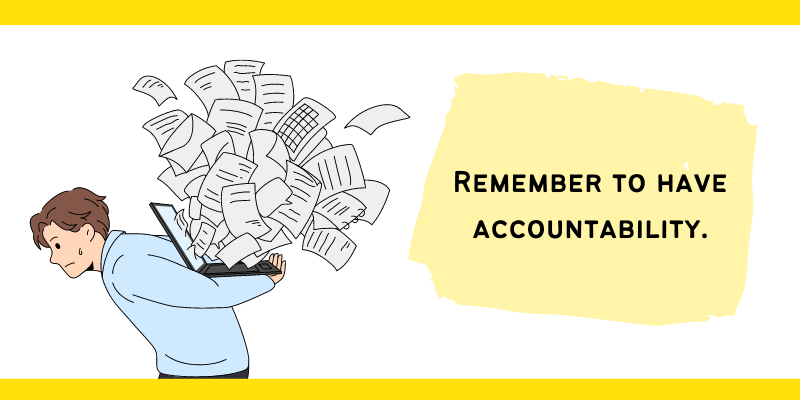As businesses reach out to more potential clients globally through online interactions, more and more are finding virtual assistants who can work remotely just as competently and efficiently as traditional, in-house, employees.
Leading motivated and well-skilled assistants requires strategic thinking, flexibility, and enthusiasm. Keeping the cycle lively and challenging can be demanding. We have listed some easy and smart tricks to keep you and your freelancers happy and challenged:
You
1. Look into the future and think of the happiness and lightness you’ll feel when you’ve accomplished what you need to do.

Your tasks may seem overwhelming to look at now, but try to imagine yourself once you’ve finished them– happy and accomplished.
Sometimes, motivation comes from that sense of accomplishment, even if you aren’t there yet. This thought process drives you to actually do it, so you can own the feeling!
2. Beware of your business’s purpose and Big Hairy Audacious Goals.

Setting Big Hairy Audacious Goals (BHAG) is not a bad thing, and every business wants to be the best in its industry.
But keep in mind that great things don’t happen in a day. You still need to work on small, specific, simple goals to achieve your BHAG– it’s a process.
On the other hand, having your BHAG do help in steering you and your team in the right direction. Keep this in sight, review them regularly, and let them inspire you when things get tough.
3. Read a lot, listen a lot, and watch a lot.

With managing a business comes continuous learning. This is also where your BHAG come in. You know where you want to go, so you begin to notice ideas and opportunities that would help you get there, including mentors, courses, and skills you should take on.
You stay up-to-date with current events and trends in your industry and this helps you generate even more ideas.
Read books and articles, listen to podcasts and talks of the town, and watch news and entertainment. Develop a love for learning and don’t stop improving your skill set!
4. Challenge yourself. Discomfort inspires action.

It’s more than adrenaline challenges. This is about publishing things. Launching things. And then learn from there. Done is better than perfect.
When you solve the same problems every day, you’ll get tired of them. Do something you have never done before. Go ahead and launch that project without worrying about every tiny detail. Go ahead and publish your podcast or live video and start getting in touch with your audience!
Just jump in. Get it done. And then later, you realize it wasn’t as bad as you feared. Exceeding your expectations gives you confidence and confidence fuels motivation.
When you feel uncomfortable, that means you’re growing.
5. Accountability.

When you’re the boss, who do you answer to? It’s a challenge in itself to not break promises you only make to yourself. We don’t always have spouses, partners, or mentors to keep us on track.
Accountability is willingly accepting responsibilities, and you have to have the motivation to be willing. Once you’re willing, then you have the motivation to get the work done. It’s a repetitive cycle.
This time, motivation comes from within. It can come from knowing the value of your work to receiving positive feedback from the team. Instead of “I have to do this,” think “I get to do this”.
Accountability is a commitment. The more you satisfy your spirit, the less you’re likely to break commitments you make to yourself.
Your Freelancers
6. Assign projects and focus on them one at a time.

Delegating tasks helps freelancers focus. Sometimes it’s hard to start working when a goal is broad and there’s no specific task.
Assign projects one at a time. Multitasking is draining while doing one thing at a time helps them focus and gain momentum. Knowing they have to finish one thing, for now, makes them more willing to get it done.
7. Valued, integrated, and informed.

Treating your freelancers like how you treat your customers–with respect– builds trust and rapport. Full-time or freelance, all your employees deserve time, attention, and recognition, too.
Introduce your freelancers to your in-house team and include them in team meetings and project briefs. Keep them informed and ask for their insights. This is how you make them feel valued– showing that they’re part of the team.
8. Share what you learn and help them learn, too. Have a regular, open dialogue.

Beyond upskilling for the benefit of the company, give them what they need to perform at their best.
Maintaining open and consistent communication with your freelancers is vital. Sharing insights helps unify your work approach to the given task. Giving positive and negative feedback boosts their confidence and helps improve their performance.
Your freelancers always want to hear from you. Stay available, and reachable, and respond as quickly as you can– let them know they can talk to you anytime.
9. Comfort. Camaraderie.

Freelancers take on different tasks from different businesses, and sometimes working alone makes them feel isolated.
Take time to get to know your freelancers– offer help, ask them questions, etc. They’ll more likely be motivated to work with and for someone who makes an effort in getting to know how they work, and collaborates accordingly.
For example, if this manager prefers emails, don’t push daily meetings and perhaps schedule a weekly or biweekly catchup instead.
10. Deadlines.

Deadlines are tricky– they can either motivate or demotivate someone. With your freelancers, you can either set or negotiate. Let them set their deadlines according to when they think they can finish the task. The best freelancers give you this without being prompted.
With setting deadlines, be reasonable. Understand their skills, limitations, and workload.
With negotiating deadlines, hear them out. One study said that internally imposed deadlines increase productivity, so your freelancers may work better with their deadlines. Either way, talk to them openly and clearly about it.

